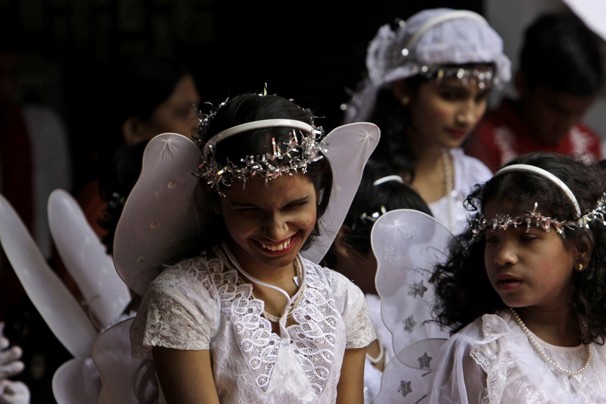U.S. support sought for treaty to allow blind people access to copyrighted works
-
Access to Knowledge
-
Accessibility

9 April 2024

Mahesh Kumar A/AP – Visually impaired children participate in a performance depicting the birth of Jesus Christ during Christmas celebrations at Devnar School for the Blind in Hyderabad, India.
This article by Rama Lakshmi was published in the Washington Post on July 24, 2012. Pranesh Prakash is quoted.
The proposed treaty would make it obligatory for countries to allow copyrighted printed published works to be converted into an accessible format for people with visual and reading disabilities and shared around the world without seeking permission from the copyright holder.
The United States and European Union agree in principle to disability access but are not committed to a legally binding global treaty. Disability advocates at the ongoing negotiations of the United Nations agency, the World Intellectual Property Organization, say that if the U.S. backs their demand, the European Union will automatically fall in line.
“The American publishers industry, comprising of the publishing giants, does not want it to be a treaty and only want it to be a set of recommendations,” said James Love, director of the Washington-based nonprofit group Knowledge Ecology International that is part of the campaign in Geneva. “The U.S. has the biggest collection of accessible English language books. It all boils down to the American government’s will. Do you or do you not believe that the American libraries should cooperate with blind people in other parts of the world?”
But American publishers say they are opposed to a treaty that has the potential to set the stage for similar exceptions and limitations to the rights of copyright owners in other areas as well.
“We are not against allowing an exception for people with print disabilities, but our concern is that a treaty will establish a precedent that they will then apply in the other areas like educational uses, library and archives,” said Allan Adler, vice president of legal and government affairs at the Association of American Publishers in a telephone interview. “Generally, international treaties establish the minimal rights of the copyright owners first, and not the limitations and exceptions to those rights.”
Adler’s view was echoed in what a U.S. delegate, Justin Hughes, told negotiators in Geneva on Thursday: “We do not accept any form of linkage between the effort on behalf of the world’s print disabled people and any other project. To us, such a linkage between the print disabilities effort and an effort for business affairs would be unprincipled, it would be unethical, and the United States will not have any part of it.”
The U.S. government also is advocating a softer, nonbinding alternative to a legally binding treaty, delegates in Geneva say.
But many disability rights groups say mere recommendations place no obligations and would be toothless.
Disability advocates say that the needs of visually impaired people are being neglected in this battle over what legal shape the agreement ultimately takes.
“The lack of access to information and knowledge is central to the debate about exclusion of visually impaired people,” said George Abraham of Score Foundation, a New Delhi-based group that supports the campaign to produce a treaty.
Time is running out, advocates of the treaty say. The negotiations began as early as 1981 but have now reached a conclusive stage that could result in a treaty by next year. The Geneva discussions end Wednesday, and lack of consensus this week would put off the negotiations to 2014. By then, most negotiators would have moved on, treaty supporters say.
This urgency has driven developing nations like India to take a strong stand. While the exact number is uncertain, experts agree that India has a high proportion of the world’s blind population, with estimates ranging from one-quarter to one-half. G.R. Raghavender, who represents the Indian government at the negotiations, said the Indian delegation “will not return empty-handed.”Earlier this year, India passed key amendments to its domestic copyrights law to permit people with visual disabilities to freely convert text material into an accessible format. But only a global treaty can allow visually disabled Indians to import and use accessible books without taking permission from the copyright-holder.
“The vast majority of visually disabled people live in poor, developing countries where very little money is spent on converting books into accessible formats, while they are much more readily available elsewhere,” said Pranesh Prakash, a lawyer at the Center for Internet and Society. “The treaty would end the book famine that they currently face.”